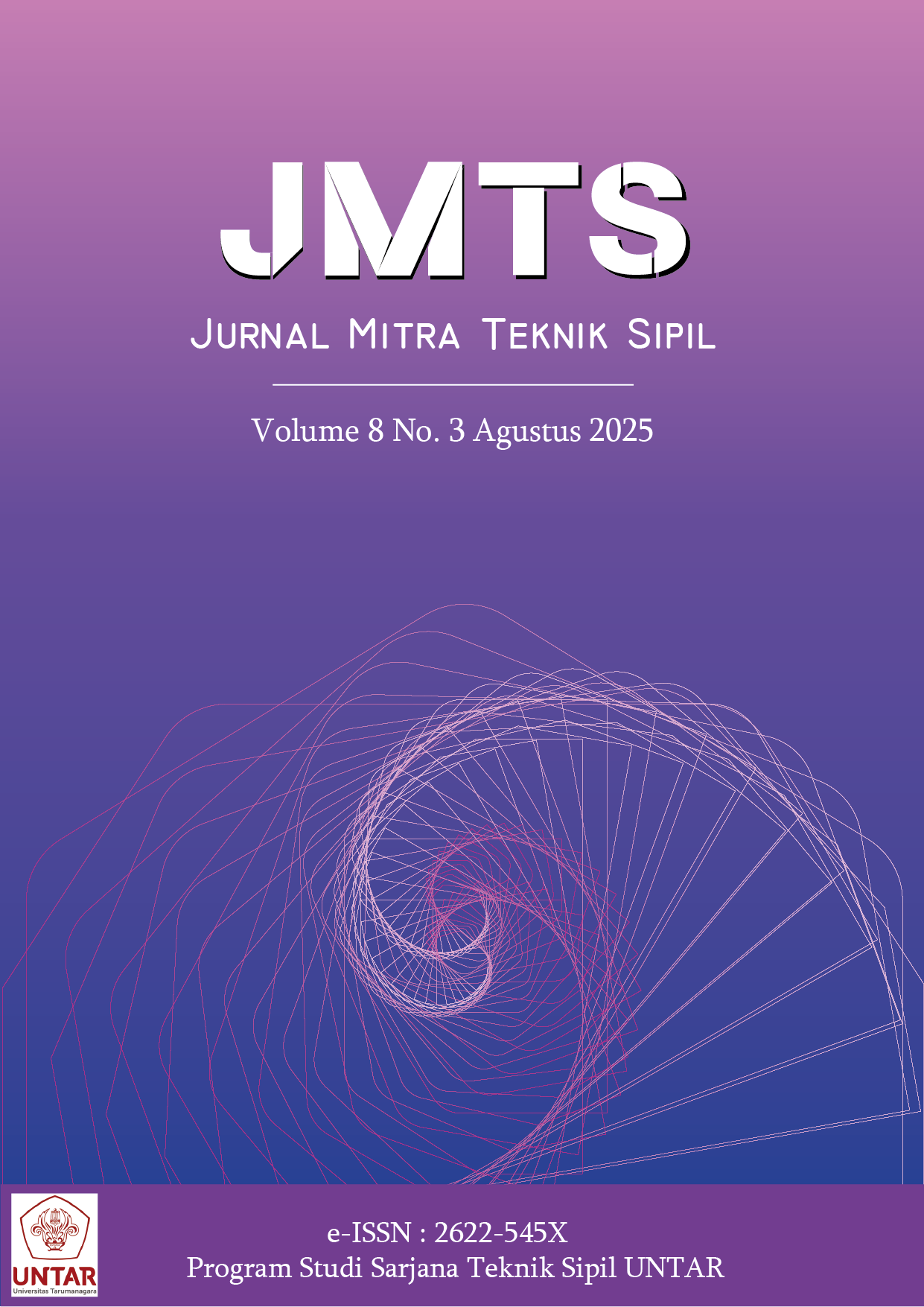PERBANDINGAN ESTIMASI DURASI PROYEK DENGAN METODE EARNED SCHEDULE DAN METODE EARNED DURATION MANAGEMENT
Main Article Content
Abstract
Work schedules are often used as a reference in construction projects as part of good initial planning. From the schedule data, contractors can estimate the final duration of the project and monitor its performance over time. Although the Earned Value Management (EVM) method is commonly used, its accuracy in predicting project duration is often questioned. Therefore, the Earned Schedule (ES) and Earned Duration Management (EDM) methods can serve as better alternatives. This research aims to compare the project duration predictions using the ES and EDM methods on two structural construction projects, labeled as Project A and Project B. The accuracy of each method is evaluated using the Mean Absolute Percentage Error (MAPE). The findings reveal that ES provides easier data acquisition than EDM, and among the tested methods, ESM-SPI(t) shows the highest prediction accuracy with an average error value close to 0%. This makes it suitable for predicting the duration of low-rise (2-4 storey) residential construction projects.
Abstrak
Jadwal kerja sering digunakan sebagai acuan dalam proyek konstruksi sebagai bagian dari perencanaan awal yang baik. Data penjadwalan digunakan oleh kontraktor untuk memperkirakan durasi akhir proyek dan memantau kinerjanya dari waktu ke waktu. Metode Earned Value Management (EVM) memang sering digunakan, namun akurasinya dalam mengestimasi durasi proyek sering dipertanyakan. Hal ini menyebabkan metode Earned Schedule (ES) dan Earned Duration Management (EDM) dapat menjadi alternatif yang lebih baik. Penelitian ini bertujuan untuk membandingkan estimasi durasi proyek menggunakan metode ES dan EDM pada dua proyek konstruksi struktur, yaitu Proyek A dan Proyek B. Keakuratan masing-masing metode dievaluasi menggunakan Mean Absolute Percentage Error (MAPE). Temuan penelitian menunjukkan bahwa pengumpulan data untuk metode ES lebih mudah dibandingkan EDM. Pengujian metode untuk ESM-SPI(t) menunjukkan tingkat akurasi estimasi tertinggi dengan nilai kesalahan rata-rata mendekati 0%. Metode ini cocok digunakan untuk mengestimasi durasi proyek konstruksi rumah tinggal bertingkat rendah (2-4 lantai).
Article Details
Section

This work is licensed under a Creative Commons Attribution-NonCommercial-ShareAlike 4.0 International License.
This work is licensed under Jurnal Mitra Teknik Sipil (JMTS) Creative Commons Attribution-ShareAlike 4.0 International License.References
Andrade, P.A., Martens, A., Vanhoucke, M. (2019). Using real project schedule data to compare earned schedule and
earned duration management project time forecasting capabilities. Journal of Automation in Construction, 99,
68-78. https://doi.org/10.1016/j.autcon.2018.11.030
Batselier, J., & Vanhoucke, M. (2015). Empirical evaluation of earned value management forecasting accuracy for
time and cost. Journal of Construction Engineering and Management, 141(11).
BSI ISO 21508:2018. (2018). Earned value management in project and programme management. British Standards
Publication
Czemplik, A. (2014). Application of earned value method to progress control of construction projects. Wroclaw
University of Technology.
Khamooshi, H., & Golafshani, H. (2013). Earned duration management, a new approach to schedule performance
management and measurement. Journal of Project Management, 159(3), 23.
Kim, B.-C., & Kim, H.-J. (2014). Sensitivity of earned value schedule forecasting to S-curve patterns. Journal of
Construction Engineering and Management, 140(7).
Lipke, W. H. (2020). Earned Schedule Plus. Gate Keeper Press
Lipke, W. H. (2012). Earned Schedule contribution to project management. PM World Journal, 1(2).
Lipke, W. H. (2009). Earned Schedule, An extension to Earned Value Management for managing schedule
performance. Lulu Publishing
Maricar, A. (2019). Analisis perbandingan nilai akurasi moving average dan exponential smoothing untuk sistem
peramalan pendapatan pada perusahaan XYZ. Jurnal Sistem dan Informatika.
Project Management Institute. (2019). The Standard for Earned Value Management. Project Management Institute,
Inc.
Project Management Institute. (2017). A Guide to The Project Management Body of Knowledge (PMBOK® guide,
6
th ed.). Newtown Square, PA: Project Management Institute.
Sruthi, M. D., Aravindan, A. (2020). Performance measurement of schedule and cost analysis by using earned value
management for a residential building. Materials Today: Elsevier Proceedings.
https://doi.org/10.1016/j.matpr.2020.05.210
Votto, R., Ho, L. L., Berssaneti, F. (2021). Earned Duration Management Control Charts: Role of Control Limit Width
Definition for Construction Project Duration Monitoring, Journal of Construction Engineering and
Management. DOI: 10.1061/(ASCE) CO.1943-7862.0002135.

